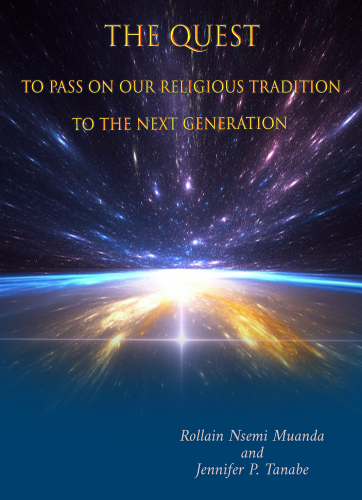Passing on Religious Tradition to the Next Generation
The opinions expressed in this article are the author’s own and do not reflect the views of Family Federation for World Peace and Unification (FFWPU) USA. Please make all comments on the original publication at appliedunificationism.com. Any comments made on FamilyFed.org will not be addressed.
Photo credit Deposit Photos

Contributed by Jennifer Tanabe
Jennifer Tanabe’s new publication, The Quest to Pass on our Religious Tradition to the Next Generation, co-authored with Dr. Rollain Nsemi Muanda, discusses the difficult challenge faced by all parents of faith in passing on their tradition to their children. The following is based upon excerpts from this book.
When we think about passing on our religious tradition to the next generation, we can assess how successful our parents were in passing on their religious tradition to us, their children. If we happily accepted our parents’ religion, there is no problem. The job was well done.
However, in many cases, including both of the authors, the children do not accept the religion of their parents, never committing fully to the beliefs, values and traditions. They pursue their own quest, searching for answers that they did not find in their own parents’ faith tradition. They may reject outright their parents’ beliefs to join a different religion, or even embrace atheism. In such situations, how should the parents respond?
We observe parental reactions that range from extreme negativity, disowning their child, through the compromise of agreeing to differ but avoiding any further discussion of religion, to the extremely positive response, where the parents may even come to embrace their son or daughter’s new-found faith.
Becoming a parent is such a deep and profound experience that changes our lives forever. Parents long to see their children happy and fulfilled, and to avoid the suffering and confusion that comes from lack of spiritual direction. Especially for parents with strong faith, it is their deepest desire for their children to become people who respect God and serve others.
Until the 20th century, the child’s world was limited to their immediate environment, that is, their parents, extended family, their village or town; later, a job or profession. Communication was limited as was travel. Thus, children had few opportunities to experience life beyond that of their family and community. Young people grew up with a lifestyle resembling that of their parents, and they also believed in their parents’ values and traditions. In other words, passing on the religious tradition was referred to as handing on to the next generation the values that determine the identity of a given society. Handing on the religious tradition was a communal affair. It was everybody’s concern: the family, the school, the church, the community, and the society. Parents did not have to worry about cultural messages from outside the family outweighing their values, for the culture usually reinforced what was being taught in the family.
These days, however, our young people are exposed to what may be called “destructive forces” which weaken the support system provided by their family and friends. Parents are faced with raising children in opposition to the dominant cultural messages. As Baptist pastor and author, Dr. Jack Hyles, notes in How to Rear Teenagers:
The parent must win the teenager daily. Each morning presents a new challenge. Remember you are in competition with the world, the school, with other beautiful young people, and you must plot your course daily in an effort to hold your own against your competitors.
More than ever before, handing on the religious tradition to the next generation has become a real challenge. It is not merely a matter of particular verbal formulations or cognitive learning. Rather, it is an ongoing process and practice. The coming generation will not inherit our religious tradition unless we witness to them through our way of life and through practical experiences in our daily deeds. Religious tradition without practice or concrete actions is perceived as a dream, an ideal which cannot be fulfilled and, therefore, it has nothing to do with them.
Today’s young people may disregard learning about any religious tradition that is not communicated in a fresh, culturally relevant manner. As David Kinnaman and Aly Hawkins’ research has shown in You Lost Me: Why Young Christians and Leaving Church … and Rethinking Faith, large numbers of young adults are leaving the churches in which they were raised. Sadly, despite spending years participating in religious youth activities and attending hours of Bible-centered teaching, these young people find no connection between their faith and their life. This comment from their book describes this unfortunate situation well:
For me, frankly, the most heartbreaking aspect of our findings is the utter lack of clarity that many young people have regarding what God is asking them to do with their lives. … They have access to information, ideas, and people from around the world, but no clear vision for a life of meaning that makes sense of all that input.
The young generation is the hope of the future; they are the ones responsible for a better tomorrow, and that is how it should be. If they do not know God’s direction for humankind, how will they create a better tomorrow? Rev. Sun Myung Moon spoke this way, in his 1974 speech “The Standard Bearer of Tradition,” on bequeathing the religious tradition to the next generation:
In a family, the one who inherits the tradition of the family is not an old man but a young man. Those who inherit the tradition of the country are also young people. This was true in the past, and it is true today as well, that those who inherit tradition are young people. … It is God’s earnest desire that young people should assume responsibility for the world. They should take responsibility to establish the tradition of God for the new world.
A true religious tradition is the “religious tradition of faith” (how a person can establish a relationship with the ultimate reality that is God), and the “religious tradition of substance” (establishing harmonious relationships with others) that advises a conscientious way of life. Hence, to pass on one’s religious tradition to the next generation is to educate the next generation to develop a conscientious way of life, a life of character; a life of respect vis-à-vis God and other people. All major religious traditions provide this type of guidance; they exist for the sake of guiding humankind to re-establish a close relationship with God.
Until relatively recently, the religions of the world were divided and distant. Today, however, all the religions of the world have close contact. As Andrew Wilson notes in World Scripture: A Comparative Anthology of Sacred Texts:
We live in an ecumenical age. The progress in transportation and communication that has brought all the peoples of the world into one global village has also brought the religions of the world into close contact … A movement for a “wider ecumenism” has begun, bringing together for dialogue leaders and scholars from all the world’s religions. Theologians of all faiths are affirming the positive worth of other religions and seeking to overcome the prejudices of an earlier time. It is now widely recognized that humanity’s search for God, or for the Ultimate Reality, called by whatever name, is at the root of all religions.
Hence, it is possible to draw or define a set of values accepted by all. Those are universal values. Universal values are what we need to hand on to the next generation.
The goal of the faith tradition must be clear to the next generation. This means the next generation should know what is expected of them in relation to the tradition. They need to know their parents’ expectations as well that of their church and community. Accordingly, the family and the church must have a common goal and work harmoniously to achieve it. If there is not a common goal so that the message of the church is consistent with that of the family, the next generation will be confused.
For many religious traditions, the quest to pass on that tradition to the next generation is considered successful if the youth accept the doctrines and practices of their parents’ faith. However, even within that acceptance there are levels of commitment. Has the young person accepted these tenets of faith out of duty, just to conform to the authority of their parents and church? Or did this young adult truly make that faith their own, critically examining their beliefs and practices and taking personal responsibility for them? In Dr. James W. Fowler’s model of faith development, discussed in Stages of Faith: The Psychology of Human Development and the Quest for Meaning, these two possibilities are characteristic of stages 3 and 4 respectively.
While the family, church and community may be satisfied with either of these levels of faith, some members of the next generation may not be. They may question more deeply, and through their life experiences come to respect and even embrace a different religious tradition. In such cases, the family and church face the prospect of alienating the next generation if they themselves cannot reach that level of faith where they respect and embrace other faiths, recognizing that their young people have matured in faith beyond their own teachings. The challenge is for the family and church leaders to raise their own standard of faith to that of Fowler’s stage 5, where the inherent mystery of transcendent reality allows for multidimensional truth and faith, and where interfaith dialogue is beneficial to all. Here, the recognition of one Creator, called by many names throughout human history, is paramount.
Again, though, there may be some who find this less than ideal. Not all faiths are tolerant of others. In fact, intolerance has been a hallmark of organized religion throughout the ages. Exclusivity, believing my faith is the one true faith, has dogged human efforts to bring about a world of peace and harmony, the original ideal of creation. Each religious tradition has its own culture and expression of truth.
For true accord among the religions there need to be universally shared values. It is those rare spiritually mature people who, having reached Fowler’s stage 6 in their faith development, can discern which are the true values in all paths of faith. With their true parental guidance, we can become one family under God, even if, like all siblings, we express ourselves and our relationship to the Almighty, our Creator, our Heavenly Parent, in our own unique ways.
Are parents and church and community elders willing to embrace the next generation on their paths, to guide them with a loving parental heart, not to a strict and narrow set of rules but to nurture their spirits to reach maturity in their relationship with God and humankind? If they can do that, the next generation will inherit the truth and goodness of their parents’ tradition.
The success of this quest will be the emergence of the ideal world of peace and happiness without immorality or decadence, where we welcome God to dwell in our families, in our daily lives; the fulfillment of the original purpose of creation, which is the ultimate goal of all religious traditions. ♦
The Quest to Pass on our Religious Tradition to the Next Generation is available for purchase in paperback or as an eBook. Co-author Dr. Rollain Nsemi Muanda (M.Div., 1999; D.Min., 2015; both from UTS) is currently pastor of the Kingston Family Church, a board member of the African Diaspora Leadership Conference (ADLC), and teaches middle school mathematics in Newburgh, NY.
Dr. Jennifer P. Tanabe was born in Scotland and earned both her bachelor’s and doctoral degrees in psychology from the University of Edinburgh. She moved to the United States as a postdoctoral fellow at the University of Minnesota’s Institute of Child Development. She has served on the faculty and in various administrative and consulting capacities at UTS and currently teaches a Research Methods course in its D.Min. program.

